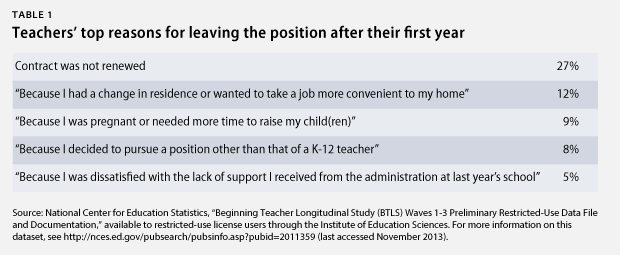Washington, D.C. — A series of reports released today by the Center for American Progress provides evidence that teachers are far more autonomous—and far more satisfied—with their professions than most Americans believe.
In light of recent education reforms, a common argument made by pundits is that teachers have grown to dislike their jobs. They argue that teachers have lost control and freedom in their profession, which has caused dissatisfaction and, ultimately, could cause them to leave the profession in droves. The reports released today examine the results of the recent 2011–2012 Schools and Staffing Survey, or SASS, a nationally representative survey of teachers administered by the National Center for Education Statistics, showing that not only are teachers satisfied with their occupations but also that a large majority of teachers choose to stay with their professions.
“When it comes to teacher autonomy, the conventional wisdom is wrong. Teachers have far more freedom and latitude than many believe,” said Ulrich Boser, co-author and Senior Fellow at the Center for American Progress. “Teachers should have autonomy over how they teach but we believe having common standards for what students should know in order to be successful in college and career promotes education as a profession and gives teachers more time to focus on how to most effectively engage their students.”
Using data from the SASS survey, as well as various state surveys, the first report, authored by Boser and CAP Senior Education Policy Analyst Robert Hanna, found overwhelming percentages of teachers reporting that they have a great deal of autonomy. Among the results, the analysis revealed that 58 percent of teachers reported that they had control over what they teach—“selecting content, topics, and skills to be taught”—and 91 percent of teachers reported that they had control over how they teach—“selecting teaching techniques.” Virtually all teachers—93 percent—reported that they had control over grading and evaluating.
A second report, authored by Hanna and CAP Education Policy Analyst Kaitlin Pennington and also based on the recent SASS data, found that the widely held public belief that teachers flee the profession after just one year of teaching is no longer true. In fact, the majority of teachers today have five years of teaching experience. This strongly suggests that a large majority of teachers have stayed in their profession during a period of dramatic education reforms that critics claimed would drive them away. According to the CAP analysis of the new data, teacher experience is actually going up over time. Eighty-seven percent of first-year teachers from 2007 to 2008 stayed through their third year. And that percentage could have been higher because the most common reason teachers left the profession after their first or second year was mostly out of their control: Their contract wasn’t renewed.

Read the reports:
To speak with an expert on this topic, contact Katie Peters at [email protected].
###